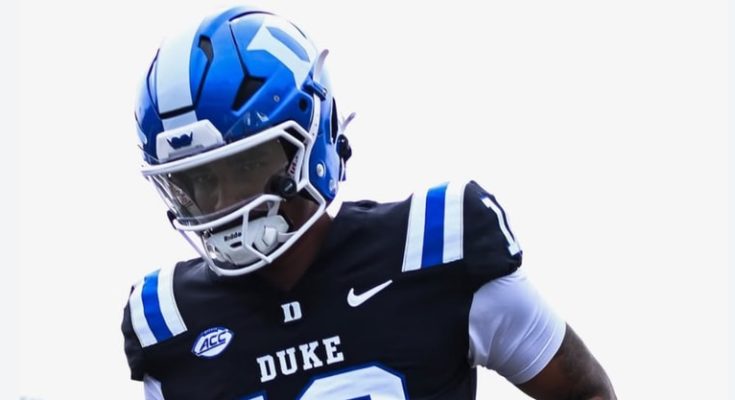The world of college football is often defined by unexpected twists, and one of the biggest surprises this offseason was the news that quarterback Darian Mensah, once a rising star at Tulane, decided to transfer to Duke. Mensah’s move has sparked conversations across the NCAA landscape, not only because of what it means for both programs but also because of the personal reasons that led him to make such a bold decision. For Duke, a program that has been working tirelessly to reestablish itself as a serious contender in the ACC, landing a quarterback of Mensah’s caliber could prove to be transformative. For Tulane, a team that has prided itself on building a strong foundation in recent years, his departure raises questions about their quarterback depth and the direction of their offensive scheme.
Mensah’s time at Tulane was marked by flashes of brilliance. Known for his quick release, strong arm, and ability to extend plays with his legs, he brought an element of unpredictability to the Green Wave offense. His dual-threat capabilities made him a nightmare for opposing defenses, and there were games where he singlehandedly changed the momentum in Tulane’s favor. But as is often the case in college football, the story behind the scenes is rarely as straightforward as it appears on the field. According to Mensah, his decision to transfer wasn’t simply about playing time or scheme fit—it was about finding a place that aligns with his long-term goals, both as a player and as a leader.
In interviews following his transfer announcement, Mensah spoke openly about the challenges he faced at Tulane. While he expressed gratitude toward his former coaches and teammates, he acknowledged that there were moments when he felt his growth as a quarterback was plateauing. Tulane’s offensive system, while effective, didn’t always allow him to showcase the full range of his abilities. Mensah described wanting more autonomy in decision-making on the field, craving an offense that encouraged creativity and adaptability, rather than relying on strict play-calling. Duke’s staff, led by head coach Manny Diaz, presented him with a vision that resonated deeply—an up-tempo system built on quick reads, high football IQ, and a willingness to let quarterbacks dictate the flow of the game.
Duke’s recent trajectory played a role in his decision as well. The Blue Devils have quietly assembled a roster brimming with talent, and their recent recruiting classes have signaled a shift in priorities. Rather than settling for mid-tier expectations, the program is aiming to compete head-to-head with ACC heavyweights like Clemson, Florida State, and North Carolina. Mensah recognized this momentum and wanted to be part of a team on the rise. “I saw a program that believed in me, not just as a quarterback but as someone who could help lead them into a new era,” Mensah reportedly told local media after finalizing his transfer. That kind of statement speaks volumes about the trust and rapport he’s already building with the Duke coaching staff.
The transfer portal has become one of the most transformative elements of college football, and Mensah’s move is a prime example of how athletes are using it to take control of their careers. For years, players were at the mercy of coaching changes, depth chart shifts, and unpredictable circumstances. Now, with the ability to transfer and play almost immediately, quarterbacks like Mensah can find the perfect environment to grow. His decision was not made lightly, and sources close to the player suggest that he spent weeks weighing his options, speaking with mentors, and considering both athletic and academic factors. Duke’s strong academic reputation also factored into his final choice, as Mensah has been vocal about wanting to succeed beyond football.
From a football standpoint, Duke is inheriting a quarterback who brings both leadership and versatility. Mensah is known for his deep understanding of defensive coverages, a skill that allows him to anticipate and exploit weaknesses in opposing defenses. His athleticism gives Duke an added dimension, especially in the red zone, where his ability to escape pressure and extend plays can be the difference between settling for a field goal and scoring a touchdown. Analysts have already begun to speculate how Duke’s offensive coordinator will design plays to take advantage of Mensah’s skill set, particularly in run-pass option (RPO) scenarios that keep defenses guessing.
For Tulane, losing Mensah is undoubtedly a tough blow. The Green Wave had hoped to build around his talent, and while they still have promising players on their roster, his departure leaves a significant gap to fill. The quarterback position is often the most scrutinized in college football, and finding someone who can replicate Mensah’s unique combination of arm strength, mobility, and leadership will be challenging. However, Tulane’s coaching staff has maintained a professional tone, publicly supporting Mensah’s decision and wishing him well at Duke. This response reflects the increasingly common understanding that players need to do what’s best for their futures, even if it means leaving a program they once called home.
The move also shines a light on how competitive the ACC is becoming. With programs like Miami, Clemson, and Florida State continuing to dominate headlines, Duke’s acquisition of a talented quarterback like Mensah could shift some of the spotlight. Quarterback play has always been the key to success in modern college football, and having someone who can handle pressure, make quick reads, and rally his team in crunch time is invaluable. If Mensah can adjust quickly to Duke’s playbook and develop chemistry with his receivers, the Blue Devils might find themselves in a much stronger position this upcoming season.
One of the most compelling aspects of Mensah’s transfer is his focus on leadership. By all accounts, he is not just a talented athlete but also a dedicated student of the game. Teammates from Tulane have described him as someone who spends extra hours studying film, perfecting his throwing mechanics, and mentoring younger players. Duke will benefit immensely from that mindset, especially as they integrate a younger roster with high expectations. Mensah’s ability to lead by example and demand excellence from himself and those around him could be the intangible factor that propels Duke to new heights.
Looking ahead, all eyes will be on how Mensah performs in his first season with the Blue Devils. College football is unforgiving, and the ACC schedule offers little room for error. Games against powerhouse programs will test his poise and adaptability, but Mensah appears to thrive in high-pressure situations. He has already begun offseason workouts with his new teammates, and early reports indicate that he’s making a strong impression in practice. Coaches have praised his accuracy on intermediate throws and his willingness to push the ball downfield, something Duke’s offense has been missing in recent years.
In the broader context of college football, Mensah’s story is a reminder that the sport is as much about personal growth as it is about winning games. His decision to transfer was not rooted in dissatisfaction but in ambition—a desire to challenge himself, to play at the highest level possible, and to position himself for a future beyond the collegiate ranks. Whether that future involves the NFL or another path remains to be seen, but there’s little doubt that his time at Duke will shape the trajectory of his career in profound ways.
As the season approaches, Duke fans have every reason to be excited. Mensah’s arrival signals a new chapter, one that could bring the program back into national relevance. His combination of skill, intelligence, and determination makes him a natural fit for the Blue Devils, and his bold decision to leave Tulane for a fresh start at Duke might just be the move that defines his legacy. If he can live up to the high expectations surrounding him, Darian Mensah could become not just the face of Duke football but also one of the most talked-about quarterbacks in the ACC this year.



